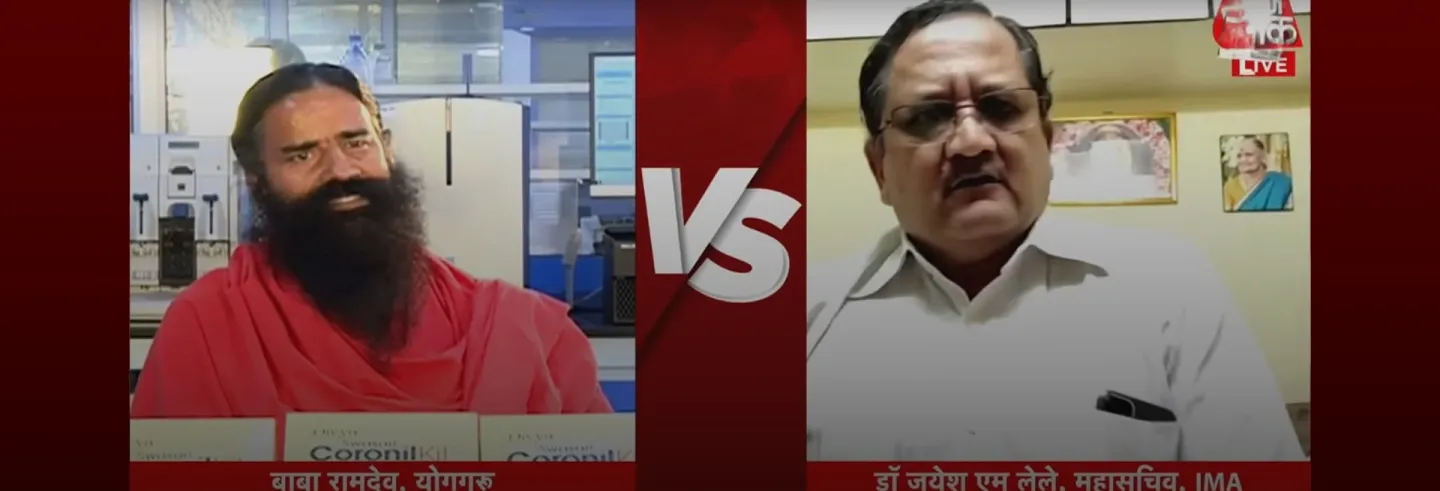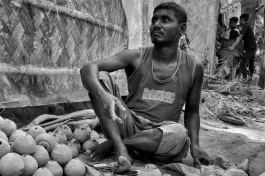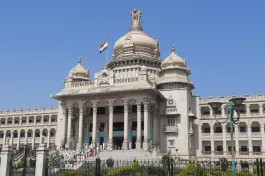As a child I was fascinated by the wrestling prowess of the one and only Dara Singh who would fight every summer in Mumbai for the 'World Championship' with contenders who had menacing names like the Red Scorpion and Black Mongoose. I was extremely disappointed when somewhere along the way my parents told me that these were not real fights. Dara Singh was not actually the world champion but just an actor, and Red Scorpion was probably some struggling local wrestler who, whilst wearing a red hood, was getting a fake beating in return for money. The wrestling jamboree was a stage-managed show to entertain people and rake in the moolah. I felt cheated. I have always wondered how many in the audience knew this. And if they did, how did they still enjoy it?. Or whether in spite of knowing did they lap it up for the entertainment it provided in their otherwise dreary lives? I guess I will never know.
Among the many sideshows that have erupted in India against the background of the grim reality of the Covid devastation has been the brawl between Baba Ramdev, the country’s most visible and influential practitioner of yoga, and the Indian Medical Association (IMA), India’s largest body of practitioners of modern medicine. Among the many quasi-comic moments from this fracas, is a video of Ramdev lying prone, wriggling his legs and with a characteristic grin on his face making fun of modern medicine and its ability to treat any disease, whilst hundreds of devotees in attendance, all doing the same leg wriggle in unison, listen to him with rapt attention. Then we had the prime-time television spectacle of the IMA’s national secretary shouting down a rather stunned Ramdev, asking him to shut up whilst he, the secretary, accused the Baba of attacking modern medicine to increase the sale of his product Coronil. The sight of the IMA secretary, a senior doctor, openly taking on a powerful Baba, who is known to be close to power, brought momentary vicarious pleasure to many doctors, including me. This seemed like an unusually belligerent IMA, which for years had largely cosied up to the party in power but was now suddenly willing to speak truth to power.
Baba Ramdev is a habitual offender with a long record of making attention-seeking comical statements about modern medicine ... There is a method in [his] madness and going by the huge growth of his empire it has worked for him.
Baba Ramdev is a habitual offender with a long record of making attention-seeking comical statements about modern medicine. It is essentially a strategic pandering to his rather large constituency of followers across India, many of whom are sympathetic to traditional medicine, especially Ayurveda. The distinction between the low-key affordable medicines offered by neighbourhood traditional practitioners and the humungous business empire built by Ramdev that thrives on a combination of fantastic claims, powerful marketing and proximity to power is not easy to discern for well-wishers of traditional medicine. There is a method in Ramdev’s madness and going by the huge growth of his empire it has worked for him. He is also assured of state patronage with two senior cabinet ministers, including the health minister, attending the launch of so-called research on the 'wonder drug' Coronil, which claims highly effective protection against Covid-19.
This time around, however, Ramdev may have got his pitch and timing wrong. Whether it was frustration due to the poor sale or a well-planned attack to shift attention to his Coronil, he stooped low even by his standards and even mocked the need for oxygen and vaccines. This invited a public rebuke from the union health minister through a letter to Ramdev which, though gently pulling him up, was dripping with false respect. The IMA has filed FIRs against Ramdev demanding his arrest. They even demanded the health minister’s resignation. This unusually militant position of the IMA may be a result of seething rage on the death from Covid-19 of a large number of its members. The IMA has historically kowtowed to the party in power. On this issue it seemed to be coming into its own as an independent professional body. Or has it?
Ayurveda in India
The popularity of Ayurveda and other traditional systems of medicine is partly a result of their strong historical roots. They also appeal to people as an alternative to the excesses, costs and inaccessibility of modern medicine (often called ‘allopathy’, a term that was first popularised by Samuel Hanemann, the 18th century inventor of homeopathy).
There are a variety of practitioners in India owing allegiance to Ayurveda. There is the traditional healer who dispenses home remedies or low-cost herbal preparations based on hereditary knowledge. Then there are the large number of formally trained Ayurveda graduates. Many of them enrolled for an Ayurveda degree not necessarily out of a love for Ayurveda but as a second-best option to the MBBS degree, an option that still gives them upward mobility, social status and even value in the marriage market. Most of them end up practicing modern medicine. They have now become an important cog in the modern medicine machine as resident doctors, intensive-care duty doctors, and operation theatre assistant surgeons. Many of them have done exemplary work in Covid facilities and, in fact, have been the actual frontline workers who have been hired at a lower pay. Then there are Ayurveda researchers who are seriously trying to study Ayurvedic drugs by applying the rigour of modern medical science. Finally, there is the large Ayurveda drug industry that straddles the space between herbal medicines and wellness products .
The IMA’s opposition to Ramdev is based more on a perceived insult and is a turf war. It is not necessarily about upholding science and attacking obscurantism.
Ramdev is in a league of his own. He is no average yogi or Ayurveda practitioner, but a politically savvy and ambitious individual who owns TV channels through which he conducts classes for thousands of followers across India and presides over a multimillion empire dabbling in drugs, wellness products and miracle cures, including for cancer. It was therefore unlikely that he would watch from the sidelines when an opportunity like Covid presented itself. However, it is only a certain kind of brazenness born out of successfully deluding people over the years that can embolden someone to claim 100% efficacy for a drug to prevent Covid when the whole world is struggling on this front. That is exactly what Ramdev did. But he also opened another front: to rubbish modern medicine. That is where he met with a backlash. This was led by the IMA and after receiving much flak, Ramdev offered a half-hearted apology.
The Indian Medical Association
The IMA is a national organisation of doctors trained in modern medicine, which was established during British rule in 1928. Many of the IMA’s leaders around the time of Independence came from the national movement. They supported the prime role of public institutions in healthcare planning and delivery. The association has since grown to have over 325,000 doctors as its members through more than 1,700 local branches across the country. It offers a space for solidarity and kinship. In many small towns in India the IMA branch is also a fraternal social club. Membership of the national IMA leadership is much coveted for its visibility.
The interests of the IMA leadership have changed over the years. This has paralleled the rise of private medicine and medical education in India. Many doctors in India are entrepreneurs and have direct investments in their clinical practice. The IMA leadership has been slowly transformed to reflect these interests. The strongest activity of the IMA in recent years has been its role in strengthening the narrative that the modern medical professionals’ interests are under threat and hence need to be defended . For example, it has consistently opposed the creation of any sort of a bridge course to train graduates of alternative and traditional systems of medicine (a substantial number in India) in modern medicine. It has also opposed the creation of short courses to create rural doctors to overcome the huge shortage of providers in large parts of India. Both these steps could have led to a massive increase in the trained workforce that rural India desperately needs, something acutely felt today in the midst of the Covid-19 pandemic.
[Ramdev] is a product of an ecosystem which in all likelihood will continue to revere and protect him.
The IMA has thus fostered a siege mentality that is typical of any guild. In most states IMA office-bearers come from the private sector, and are often the owners of private nursing homes and hospitals. In fact, many of them seek IMA positions to protect their commercial interests. In a sense, therefore, the IMA has morphed into a body representing the trade and commerce of medicine rather than of the practice of medicine as a whole. In the recent past its most rigorous involvement with health policy has been with issues directly affecting the interest of their members, usually those affecting the turf of practising medical doctors.
I had earlier shared my experience of being on a committee formed by Maharashtra to formulate a state-specific version of the Clinical Establishments Act in 2016. One of the much awaited reforms in India’s health sector has been the establishment of standard treatment guidelines. An attempt by the committee to promulgate such guidelines was opposed by the IMA. One of the terms of reference of the committee was to 'rationalise' the fee structure. Some of us thought that this was a good opportunity to come out with broad guidelines on charges and improve transparency in the billing process. The IMA representatives in the committee opposed this tooth and nail and along with other professional associations scuttled this provision from the final draft of the bill.
Not only has the IMA chosen to remain silent on some of the critical fault lines of healthcare like the need for universal healthcare, it has also ignored large-scale unethical practices in the profession like commissions and fee splitting. Their public stand has largely been knee-jerk opposition to any attempts at regulation of healthcare practice, posturing that makes the leadership popular amongst its constituency. At a recent juncture in its history, Ketan Desai, who later on was investigated and jailed for a massive corruption scandal in his capacity as president of the Medical Council of India, was elected the national president of the IMA for three years.
Professional organisations of doctors in many countries have a formidable legacy of interventions in healthcare policy. The American Medical Association (AMA) and the British Medical Association (BMA), in addition to defending the rights of medical professionals, have also successfully resisted attacks on public health, such as through budget cuts. They have often confronted the state on political issues concerning healthcare. The BMA has a glorious record of resisting Margaret Thatcher’s attempts to dismantle the National Health Service of the United Kingdom.
[T]he optics heavy turf war between Ayurveda & modern medicine that breaks out periodically in India has nothing to do with the defence of scientific medicine in both the traditional and modern systems.
Ramdev’s Coronil shenanigans were unsophisticated, so it was easy to spot them. But during the Covid-19 pandemic, India has also witnessed also a lot of dishonest science and the unethical marketing and irrational use of modern drugs. For example, principal investigators of drug trials were singing paeans to a drug in full view on the media even before the drug had undergone all the phases of clinical trials. Several drug therapies, like Remedesivir, that had no scientific evidence were used indiscriminately. If evidence-based science is the yardstick, then all systems of medicine fared poorly during the pandemic. The IMA was quiet on all this. The IMA’s opposition to Ramdev is based more on a perceived insult and is a turf war. It is not necessarily about upholding science and attacking obscurantism. It is hence unlikely to be sustained.
The fracas between Ramdev and the IMA is already showing signs of compromise with conciliatory statements from both sides. It is a matter of time before both sides climb down and are back to business as usual. Whether the Ramdev-IMA skirmish is a significant blow to the Baba’s ambition remains to be seen, but he is a product of an ecosystem which in all likelihood will continue to revere and protect him. Given the limits of modern medicine, its unaffordability and invasiveness, the space for traditional systems will always remain significant.
Conclusions
The tussle between the rationalism of science and obscurantism is complex and nuanced. The terrain that matters is not TV studio debates, but early education and day to day activities. Science needs the inculcation of a faith in the scientific process amongst large sections of people, which is very different from obtaining science degrees or posturing. Currently even modern medical education and practice in India is hugely deficient on this front. In India, attempts to promote a rationalist mindset by taking on self-styled godmen and exposing fakery can even be dangerous as we saw in the murder of Dr Narendra Dabholkar.
[C]reating an artificial chasm between doctors of various systems of medicines is a dangerous distraction from real issues in the fight against the crisis that India faces.
Covid-19 has starkly brought home the point that we urgently need organisations of medical professionals that think independently of the state and uphold the sanctity of the health of our people. Since Indian medicine is dominated by the private sector, these organisations are forced to look after the interests of the private sector. Some of them have close ties to the pharmaceutical industry and are even funded by them.
Thus, the optics-heavy turf war between Ayurveda & modern medicine that breaks out periodically in India has nothing to do with the defence of scientific medicine in both the traditional and modern systems. Egged on by television and social media, it is largely an entertaining slugfest with plenty of muscle-flexing a bit like the Dara Singh-Red Scorpion world championship fights of my childhood. What makes it worrying is that creating an artificial chasm between doctors of various systems of medicines is a dangerous distraction from real issues in the fight against the crisis that India faces. What is worse is that it can be mistaken for the key struggle between good and bad science.









